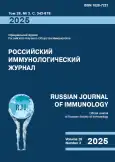Features of blood aging in Macaca fascicularis
- Authors: Sukhikh A.A.1, Zhukova D.S.2, Karal-ogly D.D.2, Klots I.N.2, Zlobina A.P.2, Akulov A.P.1, Tereshchenko V.P.1, Rybtsov S.A.1
-
Affiliations:
- Sirius University of Science and Technologies
- National Research Centre “Kurchatov Institute”, Kurchatov Complex of Medical Primatology
- Issue: Vol 28, No 3 (2025)
- Pages: 403-408
- Section: SHORT COMMUNICATIONS
- URL: https://journal-vniispk.ru/1028-7221/article/view/319876
- DOI: https://doi.org/10.46235/1028-7221-17206-FOB
- ID: 319876
Cite item
Full Text
Abstract
The study of hematopoietic system aging in non-anthropoid primates such as the Сynomolgus macaque (Macaca fascicularis) provides a unique opportunity to understand the evolutionarily conserved mechanisms of human aging and the age-related dynamics of the main cellular and biochemical parameters of peripheral blood. These data are helpful for evaluating the results of preclinical studies on animals of different age groups. Aging of immune system is accompanied by impaired cellular function and changed ratios of cell populations in circulating blood. Despite similarity of quantitative indices, the age-related dynamics of blood cells are different in humans and Сynomolgus macaque. The aim of the study was to conduct a comparative analysis of age-related changes in cellular composition of blood and biochemical parameters of blood in Cynomolgus macaques and human donors. This study included groups of animals aged 4-9 years, as well as a unique group of old individuals aged 18-27 years. In addition, we analyzed blood samples obtained from volunteer donors of different age groups (20-30, 31-56 and 57-85 years). Absolute blood cell counts in donors and macaques were assessed, biochemical blood analysis was performed in macaques of different age groups, and a comparative analysis of blood aging in humans and macaques was conducted. In this study, macaques showed a decrease in platelet counts with age, indicating a decreased production of megakaryocytes and their precursors in bone marrow. Aging in Сynomolgus macaques was also accompanied by a significant increase in triglyceride and globulin levels in the blood, as well as a trend toward a decrease in albumin levels, thus reducing the total albumin/globulin ratio. This index in human donors is associated with overall health, and its decrease is observed with age. In males and females, there is also a trend toward an increase in glucose, bilirubin, cholesterol, and inflammatory enzymes with age. Creatinine levels were significantly higher in males regardless of age and exceeded this indicator in females.
Full Text
##article.viewOnOriginalSite##About the authors
Artjom A. Sukhikh
Sirius University of Science and Technologies
Author for correspondence.
Email: suhih.aa@talantiuspeh.ru
Researcher
Russian Federation, Sirius settlement, Krasnodar RegionDarya S. Zhukova
National Research Centre “Kurchatov Institute”, Kurchatov Complex of Medical Primatology
Email: juk93vet@mail.ru
Head, Veterinary Department
Russian Federation, Vesyoloye village, Krasnodar RegionDzhina D. Karal-ogly
National Research Centre “Kurchatov Institute”, Kurchatov Complex of Medical Primatology
Email: karal_5@mail.ru
PhD (Biology), Leading Researcher
Russian Federation, Vesyoloye village, Krasnodar RegionIgor N. Klots
National Research Centre “Kurchatov Institute”, Kurchatov Complex of Medical Primatology
Email: igor-imp@mail.ru
PhD (Biology), Senior Researcher
Russian Federation, Vesyoloye village, Krasnodar RegionAnastasia P. Zlobina
National Research Centre “Kurchatov Institute”, Kurchatov Complex of Medical Primatology
Email: intelegent.l@yandex.ru
Technician
Russian Federation, Vesyoloye village, Krasnodar RegionAleksandr P. Akulov
Sirius University of Science and Technologies
Email: akulov.ap@talantiuspeh.ru
Senior Technician
Russian Federation, Sirius settlement, Krasnodar RegionValeriy P. Tereshchenko
Sirius University of Science and Technologies
Email: tereschenko.vp@talantiuspeh.ru
ORCID iD: 0000-0002-1620-6447
SPIN-code: 3241-2577
PhD (Medicine), Senior Researcher
Russian Federation, Sirius settlement, Krasnodar RegionStanislav A. Rybtsov
Sirius University of Science and Technologies
Email: rybtsov.sa@talantiuspeh.ru
ORCID iD: 0000-0001-7786-1878
PhD (Biology), Head, Resource Center for Cell Technologies and Immunology
Russian Federation, Sirius settlement, Krasnodar RegionReferences
- Chen Y., Ono F., Yoshida T., Yoshikawa Y. Relation between body weight and hematological and serum biochemical parameters in female Cynomolgus Monkey (Macaca Fascicularis). Exp. Anim., 2002, Vol. 51, no. 2, pp. 125-131.
- Choi K., Chang J., Lee M.-J., Wang S., In K., Galano-Tan W.C., Jun S., Cho K., Hwang Y.-H., Kim S.-J., Park W. Reference values of hematology, biochemistry, and blood type in cynomolgus monkeys from cambodia origin. Lab. Anim. Res., 2016, Vol. 32, no. 1, pp. 46-55.
- Li X., Li D., Biddle K.E., Portugal S.S., Li M.R., Santos R., Burkhardt J.E., Khan N.K. Age- and sex-related changes in body weights and clinical pathology analytes in cynomolgus monkeys (Macaca Fascicularis) of Mauritius origin. Vet. Clin. Pathol., 2022, Vol. 51, no. 3, pp. 356-375.
- Xie L., Xu F., Liu S., Ji Y., Zhou Q., Wu Q., Gong W., Cheng K., Li J., Li L., Fang L., Zhou L., Xie P. Age- and sex-based hematological and biochemical parameters for Macaca fascicularis. PLoS One, 2013, Vol. 8, no. 6, e64892. doi: 10.1371/journal.pone.0064892.
Supplementary files









